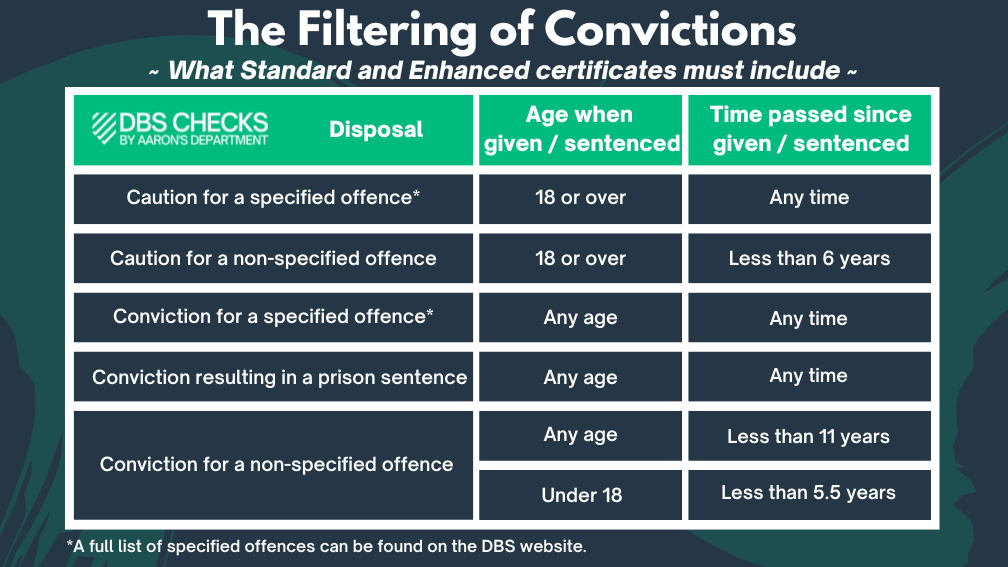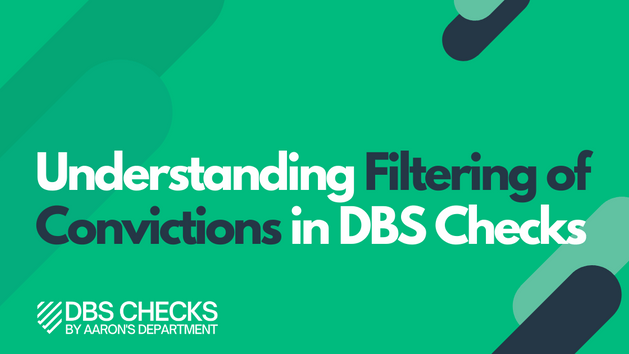Introduction – The Filtering of Convictions in DBS Checks
Filtering of Convictions happens during the DBS processes. When an individual applies for a job that involves working with vulnerable groups, they may be required to undergo a Disclosure and Barring Service (DBS) check. The purpose of this check is to assess an individual’s criminal record and identify any convictions or cautions that may pose a risk to vulnerable groups.
However, not all convictions or cautions are relevant to the position being applied for, and some may have occurred a long time ago. This is where filtering of convictions is important.
Table of Contents
What Is The Filtering Of Convictions?
The filtering of convictions is the process by which certain convictions and cautions are removed from a DBS check result. This means that they will not be disclosed to the employer or organisation requesting the check.
The aim of filtering convictions is to ensure that individuals are not unfairly penalised for past mistakes that are no longer relevant to their current circumstances.
Who Is Eligible For Filtering?
The eligibility for filtering of convictions depends on several factors, including the age of the individual at the time of the conviction, the nature and severity of the offence, as well as the length of time since the conviction.
Generally, only minor offences or those committed a long time ago are eligible for filtering. The DBS has specific guidelines in place to determine which offences are eligible for filtering, DBS Filtering Guidelines, and these guidelines are regularly reviewed and updated. There are certain offences that will never be filtered and will always be disclosed on a Standard or Enhanced DBS certificate (unless they relate to a youth caution). These are ‘specified offences’ and are usually of a sexual or violent nature or are relevant to safeguarding vulnerable adults and also children. You can find this list here.


The Types Of Offences Eligible For Filtering
There are two types of offences that are eligible for filtering: protected convictions and protected cautions.
Protected convictions refer to those that are considered minor offences and occurred a long time ago. For example, a conviction for a minor driving offence that occurred over 11 years ago may be eligible for filtering.
Protected cautions refer to cautions that are considered minor and occurred over 6 years ago. These are usually non-violent offences, such as minor theft or possession of drugs for personal use.
The table below shows the information that is included on Standard and Enhanced DBS checks:


The Effect of Filtering on Employment Opportunities
Filtering of convictions can have a significant impact on an individual’s employment opportunities.
Without filtering, a conviction or caution may appear on a DBS check result, and this may deter employers from hiring the individual. This can be particularly damaging for those who have made mistakes in the past but have since turned their lives around and are now seeking employment.
By filtering out minor and historical offences, individuals are given a fair chance to compete for jobs that require a DBS check.
Update: 28th October 2023
As of the 28th of October 2023, there has been a minor update to the Filtering of Convictions rules. You can read more about this DBS Update in our recent article: What the Changes to DBS Filtering Rules Mean For You
Summary: Filtering of Convictions
In conclusion, the filtering of convictions is a process that allows individuals with minor and historical convictions and cautions to have a fair chance at employment opportunities that require a DBS check.
The eligibility for filtering depends on several factors, including the nature and severity of the offence and the length of time since the conviction.
Forward this page!
Further Reading – Filtering Of Convictions
About The Author


Kellie Dawson
Kellie is our in-house legal expert when it comes to DBS checks. With a background in the legal sector, she has become a recognised authority in this area.

When I was in my teens I did get a criminal record im now in my late 50s and stil get worked up when I send for a DBS check although I’ve never been refused a job on my past convictions
I recently applied for a tutor position within a prison. During the vetting process, an issue arose concerning a caution from 2015, which is filtered and does not appear on an enhanced DBS check, copy attached.
My application was rejected due to this caution, and I have recently learnt that my appeal was unsuccessful. The reason provided was:
“As stated within the vetting questionnaire you completed, HMPPS are exempt from the Rehabilitation of Offenders Act 1974 and take into consideration all convictions/cautions, including any which are now considered spent under this Act.”
This decision appears to directly contradict HMPPS’s own published policies. Information provided to Unlock website explicitly states:
“Prison and probation roles are not exempt, meaning applicants are legally entitled to withhold this information. Filtered cautions and convictions do not need to be disclosed, as these are not considered as part of the vetting decision making process.
Although the offence might not show on a DBS it still shows on the PNC record. This goes against the spirit and intent of the filtering system.